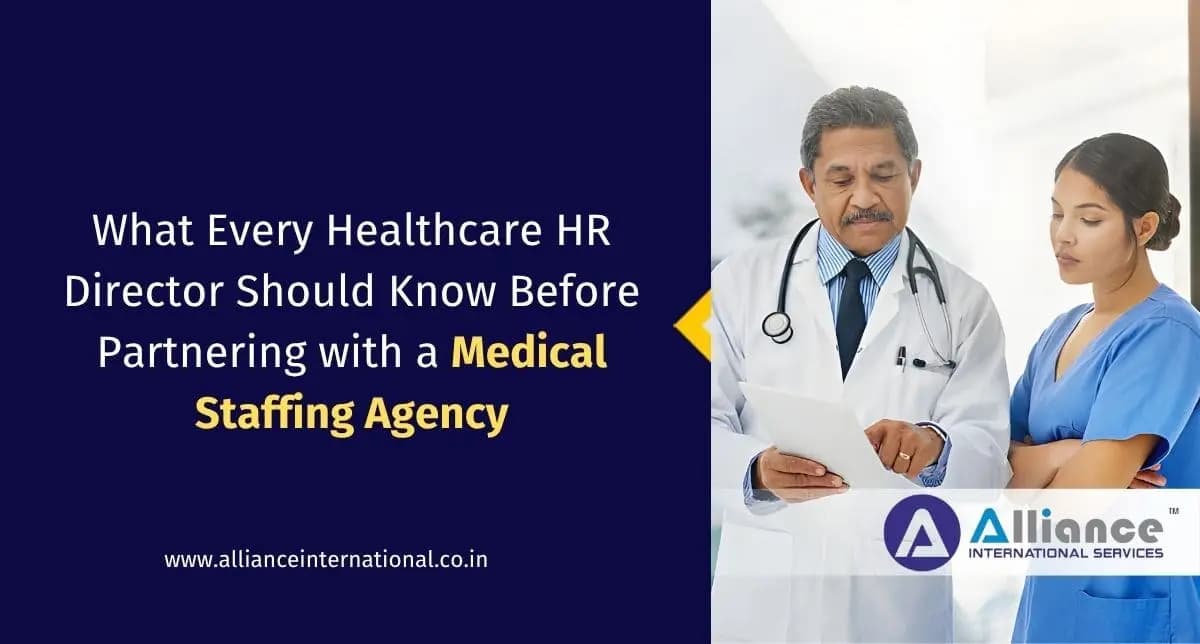What Every Healthcare HR Director Should Know Before Partnering with a Medical Staffing Agency

Table of Contents
Hiring and retaining skilled healthcare professionals has become one of the most pressing challenges for hospital HR leaders. With increasing turnover, staffing shortages, and strict compliance requirements, maintaining high-quality patient care can be stressful. Medical staffing agencies offer a strategic solution, providing qualified personnel quickly and efficiently.
If you’re a healthcare HR director, understanding the critical factors before forming a partnership with a medical staffing agency can save time, reduce costs, and ensure better outcomes for both patients and staff. This guide covers everything HR leaders need to know before making this important decision.
Understanding the Role of Medical Staffing Agencies in Modern Healthcare
Medical staffing firms specialize in connecting hospitals, clinics, and healthcare facilities with skilled professionals — from nurses and physicians to allied health staff. Unlike general recruiters, these agencies possess deep knowledge of credentialing, compliance, and licensing, ensuring every candidate is fully qualified to meet industry standards.
Partnering with healthcare staffing agencies allows HR teams to focus on core responsibilities, such as employee engagement and operational management, while the agency handles recruitment logistics. This collaboration is especially valuable for hospitals facing fluctuating patient volumes or temporary staffing gaps. If you want to dive deeper into HR strategies for partnering with a medical staffing agency,
Key Benefits of Partnering with a Medical Staffing Agency
Working with a reputable medical staffing agency provides numerous advantages for HR leaders:
- Faster Hiring Turnaround: Agencies maintain extensive databases of pre-qualified professionals, reducing the time to fill critical positions. Hospitals can save weeks of recruitment effort, which is covered in this guide on how medical staffing agencies save time.
- Access to Specialized Talent: Whether you need ICU nurses, radiologists, or therapists, staffing agencies can quickly source candidates with the right expertise.
- Compliance and Credentialing Support: Agencies manage licenses, background checks, and credential verification, reducing legal and operational risks.
- Cost Efficiency: Using an agency can lower recruitment, advertising, and onboarding expenses compared to in-house hiring.
- Improved Patient Care: Timely placements ensure patient safety and continuity of care, while reducing burnout among existing staff.
When executed effectively, a medical staffing agency partnership can function as an extension of your HR department rather than just a recruitment vendor. Additionally, understanding how AI is changing healthcare staffing can give HR directors insights into improving efficiency and workforce planning.
7 Things Every HR Director Should Evaluate Before Partnering
Selecting the right staffing partner requires careful consideration. Here are seven factors every HR director should evaluate:
1. Verify Licensing, Accreditation, and Compliance Standards
Ensure the agency meets all legal and industry requirements. Proper accreditation and compliance checks protect your hospital from liability and guarantee that every candidate is qualified and authorized to practice in your facility.
2. Assess Candidate Screening and Credentialing Processes
Review how the agency vets candidates, including certifications, background checks, and references. Thorough screening ensures only competent, reliable professionals are placed, maintaining patient safety and your hospital’s reputation.
3. Check Industry Experience and Specialization
Partner with agencies experienced in your healthcare sector. Specialized knowledge ensures they understand your unique staffing needs, whether it’s ICU nurses, allied health professionals, or specialized medical units.
4. Evaluate Communication and Response Time
A responsive agency is critical for timely placements and emergency coverage. Confirm they provide quick support and clear communication channels to address staffing gaps efficiently.
5. Understand Cost Structure and Transparency
Request detailed pricing, including fees and markups. Transparent cost structures help avoid unexpected charges, allow accurate budgeting, and enable fair comparisons between agencies.
6. Ask About Retention and Support Policies
Good agencies support candidates post-placement, offering onboarding and ongoing engagement. This reduces turnover, ensures workforce stability, and enhances overall employee satisfaction in your facility.
7. Request Client References and Case Studies
Ask for examples of past placements and satisfied clients. References and case studies provide evidence of reliability, quality, and performance, helping you select a trustworthy reliable healthcare recruitment partner.
Common Mistakes to Avoid When Choosing a Medical Staffing Agency
- Focusing solely on cost: The cheapest option may compromise quality.
- Ignoring compliance verification: Hiring non-compliant staff can lead to fines or reputational damage.
- Skipping service level agreements (SLAs): Define KPIs for fill rates, candidate quality, and response time.
- Neglecting cultural alignment: The agency should understand your hospital’s values and workflow.
- Short-term mindset: Look for agencies capable of long-term partnerships to ensure continuity.
Building a Long-Term, Reliable Healthcare Recruitment Partnership
To maximize the value of your collaboration, focus on building a partnership rather than a transactional relationship:
- Set Performance Reviews: Track fill rates, candidate quality, and retention.
- Share Workforce Forecasts: Agencies can plan proactively if they know your upcoming staffing needs.
- Encourage Two-Way Communication: Maintain feedback loops between HR, the agency, and placed candidates.
- Leverage Technology: Many agencies use dashboards to track shifts, compliance, and workforce metrics for greater transparency.
- Reward Consistency: Recognize agencies that consistently deliver quality talent on time, ensuring priority service in critical situations.
When these elements are in place, your staffing partner becomes a strategic ally, helping your facility thrive even during workforce challenges.
Final Thoughts: Make Data-Driven Staffing Decisions
For healthcare HR directors, every staffing choice impacts patient care, employee satisfaction, and operational costs. Partnering with the right medical staffing agency ensures access to qualified professionals, reduces administrative burden, and enhances workforce stability.
By carefully choosing the right medical staffing agency, evaluating their processes, and fostering a long-term relationship with a reliable healthcare recruitment partner, HR leaders can secure a staffing solution that improves both patient outcomes and staff morale.
Remember, staffing agencies are more than temporary hires — they are strategic partners in achieving operational excellence. With the right agency by your side, your hospital can maintain high standards of care while optimizing costs and efficiency, all while supporting your dedicated HR and medical teams. For additional insights into hospital staffing solutions, check this resource for practical applications.
